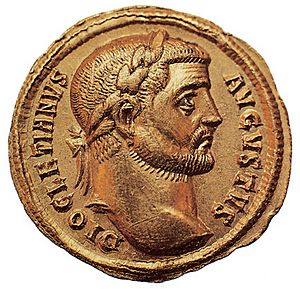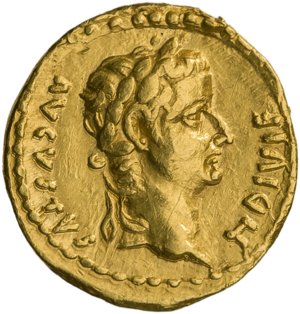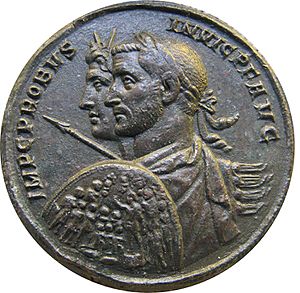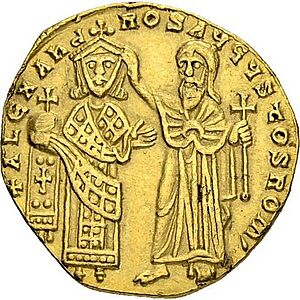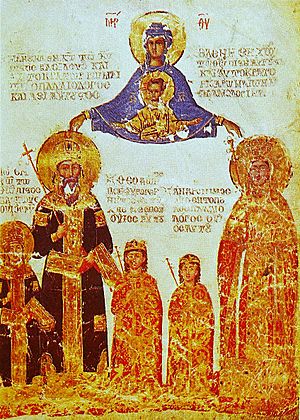Augustus (title) facts for kids
Augustus was an important title in Ancient Rome. It means "majestic," "great," or "venerable." This title was first given to Gaius Julius Caesar Octavianus, who became Rome's first Roman Emperor. After he died, it became an official title for all future Roman emperors.
The female version, Augusta, was used for Roman empresses and other important women in the Imperial family. Both the male and female forms of the title came from the time of the Roman Republic. They were linked to things considered holy or special in traditional Roman religion. Using these titles for gods and goddesses helped connect the Roman emperors and their families to traditional Roman values and the idea of divine power. This was part of the Roman Imperial cult, which was like a special religious worship of the emperor.
In the Greek-speaking parts of the Roman Empire, "Augustus" was translated as Sebastos (meaning "venerable"). Sometimes, it was just made to sound Greek, like Augoustos. These titles continued to be used in the Byzantine Empire until its fall in 1453. However, over time, they became less exclusive to just the emperor.
After the fall of the western Roman Empire, the title "Augustus" was later used by the Holy Roman Emperor. For example, Charlemagne used the title serenissimus Augustus. Because of this, "Augustus" was sometimes used as a name for noblemen, especially in the lands of the Holy Roman Empire. It is still a given name for boys today.
Contents
The Title in Ancient Rome
Early Uses of Augustus
About 30 years before it was linked to Caesar's heir, "Augustus" was a less common honorific. It had religious meanings. For example, in 58 BC, it was connected to provincial Lares, who were Roman household gods. In Roman writings, it meant making something already sacred even more important. Some Romans believed it was linked to augury, which was the practice of predicting the future using signs. Rome itself was said to have been founded with the "august augury" of Romulus.
How Emperors Used the Title
The first true Roman Emperor to be called "Augustus" was Octavian. He was the adopted son of Julius Caesar, who had been killed because people thought he wanted to be a divine king. Caesar was later officially made a god. Octavian was careful not to seem like he wanted to be a god, but he did accept his role as Divi filius ("son of the deified one").
Octavian's position was very special. He had ended Rome's long and bloody civil war with his victory at Actium. He brought lasting peace to the empire. It seemed clear that the gods favored him. He was the princeps senatus (the "first man" or head of the Senate). He was also pontifex maximus, the chief priest of Rome's state religion. He held the power of a consul, which meant he had authority equal to the main executive leader. He was the supreme commander of all Roman legions. He also had tribunicia potestas ("tribunician power"). This meant his person was sacred and could not be harmed. He could also veto (block) any action or proposal by any official in Rome.
The Roman Senate officially renamed him Augustus on January 16, 27 BC. Some think he might have carefully chosen this name himself. He had considered "Romulus," but rejected it because it would have made him seem like the second founder of Rome, which was too obvious. So, his official renaming to a title linked to traditional Roman religion, but new as a cognomen (a family name or nickname), showed that his power came from Rome and its gods. It also hinted at his unique, special, and "godlike" abilities. His full official title became Imperator Caesar Divi Filius Augustus.
Augustus's religious changes also made Augusti a common title for many smaller local gods. This included the Lares Augusti of local communities and less known gods in the provinces, like Marazgu Augustus in North Africa. Giving an Imperial title to gods across the empire was a key part of the Imperial cult. This continued until Christianity officially replaced Rome's traditional religions. The title's religious flexibility allowed for this kind of deification. People in provinces like Asia and Bithynia began to worship the genius (or spirit) of Augustus, starting a ruler-cult.
The first emperor passed the title Augustus to his adopted heir, Tiberius, in his will. From then on, Augustus became a part of the emperor's name, even though it didn't give any specific legal powers. Later, the Roman Senate would grant the title. Until the reign of Marcus Aurelius (161-180 AD), only one person held the title at a time. But in 161 AD, Marcus Aurelius made Lucius Verus (161-169 AD) an Augustus too, so they both held the title at the same time.
The day an emperor received the title Augustus was called the dies imperii (day of empire) and was celebrated every year. From the 3rd century, new emperors were often declared Augusti by the army. Emperors also inherited Caesar (originally a family name) as part of their titles. The Tetrarchy, a system set up by Diocletian, shared power between two Augusti and two Caesares. However, as the Augustus senior, Diocletian kept the power to make laws. Diocletian and his successor, Constantine the Great, both used the title semper Augustus ('ever Augustus'). This shows that the name became more formal in the late 3rd and early 4th centuries. From Constantine's reign onward, the Greek translation Sebastós was replaced by the similar-sounding Aúgoustos.
Starting with Valentinian the Great and his brother Valens, whom he made Augustus with equal power in 364 AD, the emperors of the eastern and western parts of the empire had equal standing. The last emperor declared in the West, Romulus (475-476 AD), used Augustus not just as a title, but also as part of his proper name.
After the victory over the Sasanian Empire in the Byzantine–Sasanian War of 602–628, Emperor Heraclius introduced the title basileús (monarch). After his reforms in 629 AD, the title Augoustos became less important. Before Heraclius, royal titles had been avoided in Rome since the legendary overthrow of the last Roman king, Tarquinius Superbus, by Lucius Junius Brutus in the late 6th century BC.
The Imperial titles of imperator, caesar, and augustus were translated into Greek as autokratōr, kaisar, and augoustos (or sebastos). The Greek titles were used in the Byzantine Empire until it ended in 1453. However, sebastos lost its special imperial meaning, and autokratōr along with basileus became the main titles for the emperor after the 8th century.
The Female Version: Augusta
Augusta was the female form of Augustus. It also started as a less common word with religious connections. This title was given to some women in the Imperial families. It showed their power and influence, and a status close to being divine. No other title had more prestige. This title was also shared by goddesses linked to the Imperial family's generosity, such as Ceres, Bona Dea, Juno, Minerva, and Ops. It was also given to local or minor goddesses across the empire. Other ideas seen as female, like Pax (peace) and Victoria (victory), were also called Augusta.
The first woman to receive the title Augusta was Livia Drusilla. This happened through the last will of her husband, Augustus. From his death in 14 AD, she was known as Julia Augusta until her own death in 29 AD.
Other Uses of Augustus
Holy Roman Empire
Charlemagne used the title serenissimus Augustus as a special part of his own titles. Otto I used the style imperator Augustus. This simpler style, without mentioning Rome, was a way to show respect to the Byzantine Empire, which was very powerful at the time. By the 12th century, the standard title for the Holy Roman Emperor became Dei gratia Romanorum imperator semper Augustus (By the grace of God, Emperor of the Romans, ever Augustus). This title remained in use until at least the 16th century.
The phrase semper Augustus ("ever exalted") was translated into German in the later period of the Holy Roman Empire. It was not translated word-for-word, but as allzeit Mehrer des Reiches ("ever Increaser of the Realm"). This came from the meaning of the Latin word augere, which means "to augment" or "increase."
Brian Boru
The Irish High King Brian Boru (around 941 – 1014 AD) was described in the Annals of Ulster as ardrí Gaidhel Erenn & Gall & Bretan, August iartair tuaiscirt Eorpa uile. This means "High King of the Gaels of Ireland, the Norsemen and the Britons, Augustus of the whole of north-west Europe." He was the only Irish king to receive this special title.
See Also
 In Spanish: Augusto (título) para niños
In Spanish: Augusto (título) para niños
- Archons
- Auctoritas
- Basileus
- List of Augustae
 | May Edward Chinn |
 | Rebecca Cole |
 | Alexa Canady |
 | Dorothy Lavinia Brown |


